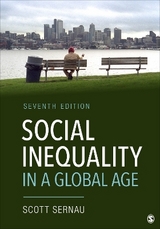
Social Inequality in a Global Age
SAGE Publications Inc (Verlag)
978-1-5443-0931-6 (ISBN)
- Titel erscheint in neuer Auflage
- Artikel merken
Social Inequality in a Global Age provides a sociological framework for analyzing inequality within the United States in the context of global stratification and a rapidly changing world economy. With insightful analysis, and using examples drawn straight from today′s headlines, Scott Sernau explores the multiple dimensions of inequality—class privilege, race and ethnicity, gender and sexuality, status and power—and how they intersect with each other. As it explores each dimension of inequality, the text analyzes the relationship between changing global power structures and growing inequalities within societies . Throughout, a focus on social action and community engagement encourages students to become involved, active learners in the classroom and engaged citizens in their communities.
Scott Sernau is professor of sociology and director of International Programs at Indiana University, South Bend, where he regularly teaches social inequality, international inequalities, sustainability and urban society. He has received multiple campus and university awards for distinguished teaching and distinguished service to teaching and learning. He is editor of Contemporary Readings in Globalization (SAGE) and his previous books include: Economies of Exclusion (Praeger), Critical Choices (Oxford), Bound: Living in the Globalized World (Stylus), and Global Problems: The Search for Equity, Peace and Sustainability (Pearson).
Preface
Acknowledgments
PART I. ROOTS OF INEQUALITY
Chapter 1. The Gordian Knot of Race, Class, and Gender
Dimensions of an Unequal World
Intersections of Race, Class, and Gender in the United States
The Development of Inequality: Race, Class, and Gender Across Societies
A Social Network Understanding of Inequality
Key Points
For Review and Discussion
Making Connections
Chapter 2. The Great Debate
The Historical Debate
The Sociological Debate
Reframing the Debate
Key Points
For Review and Discussion
Making Connections
Chapter 3. The Global Divide: Inequality Across Societies
Worlds Coming Apart and Coming Together
The Double Divide
The Global Debate
Globalization: The Ties That Bind
Immigration: Seeking to Cross the Divide
The Market Paradox
Key Points
For Review and Discussion
Making Connections
Making a Difference
Fair Trade
Photo Essay: Honduras
PART II. DIMENSIONS OF INEQUALITY
Chapter 4. Class Privilege
Wealth and Property
Occupation
Income
Class Structure
Growing Inequality
Death and Taxes: Redirecting Wealth and Income
Key Points
For Review and Discussion
Making Connections
Chapter 5. Racial and Ethnic Inequality
A Debt Unpaid: Internal Colonialism
Middleman Minorities and Ethnic Solidarity
The Analytic Debate: Cultures and Structures of Poverty
Colorful Language
The Color of Justice
Key Points
For Review and Discussion
Making Connections
Making a Difference
Photo Essay: Navajoland
Chapter 6. Gender and Sexual Inequality
When Men Were Men
From Glass Slippers to Glass Ceilings
Work and Family: The Double Burden and the Second Shift
Gender and Class Around the World
Changing Norms on Gender and Sexuality
Key Points
For Review and Discussion
Making Connections
In the Media
Making a Difference
Chapter 7. Status Prestige
The Quest for Honor
Socialization: Acquiring Marks of Distinction
Association: Whom You Know
Lifestyles of the Rich and the Destitute
Tastes in Transition
Key Points
For Review and Discussion
Making Connections
Chapter 8. Power and Politics
People Power and Powerful People
Who Rules? The Power Elite Debate
Changing the Rules: Campaign Finance Reform
Global Power: Who Really Rules?
Key Points
For Review and Discussion
Making Connections
PART III. CHALLENGES OF INEQUALITY
Chapter 9. Moving Up: Education and Mobility
Getting Ahead
Education: Opening Doors, Opening Minds
No Child Left Behind
Ladders With Broken Rungs
Key Points
For Review and Discussion
Making Connections
Making a Difference
Chapter 10. Abandoned Spaces, Forgotten Places: Poverty and Place
Urban Poverty: Abandoned Spaces
The Making and Unmaking of the Postindustrial City
Brain-Gain and Brain-Drain Cities
Suburban Poverty: The Urban Fringe
Rural Poverty: Forgotten Places
Poverty in the Global Ghetto
Key Points
For Review and Discussion
Making Connections
Making a Difference
Photo Essay: Deindustrialization and Revival
Chapter 11. Reversing the Race to the Bottom: Poverty and Policy
From Welfare to Work
The Challenge of the Margins: Antipoverty Programs
Extreme Poverty: Homelessness and Hunger
Poverty Programs Among Advanced Industrial Nations
The Private World of Poverty
Key Points
For Review and Discussion
Making Connections
Making a Difference
Chapter 12. Challenging the System: Social Movements in a Global Age
The Enduring Struggle: The Labor Movement
Gender and Power: The Women’s Movement
Gay Rights: Gender Identity, Sexuality, and Equal Access
Race and Power: The Civil Rights Movement
The Happiest Places on Earth
One World After All
Key Points
For Review and Discussion
Making Connections
Making a Difference
Glossary
References
Index
About the Author
| Erscheinungsdatum | 10.10.2019 |
|---|---|
| Verlagsort | Thousand Oaks |
| Sprache | englisch |
| Maße | 177 x 254 mm |
| Gewicht | 730 g |
| Themenwelt | Sozialwissenschaften ► Soziologie ► Allgemeine Soziologie |
| Sozialwissenschaften ► Soziologie ► Empirische Sozialforschung | |
| ISBN-10 | 1-5443-0931-7 / 1544309317 |
| ISBN-13 | 978-1-5443-0931-6 / 9781544309316 |
| Zustand | Neuware |
| Haben Sie eine Frage zum Produkt? |
aus dem Bereich



